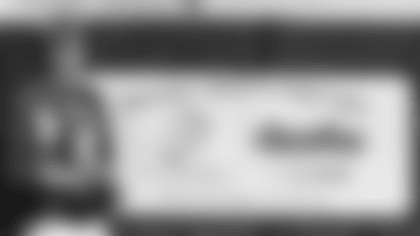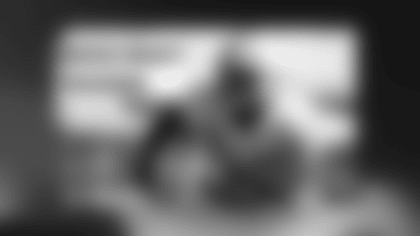The next eight weeks for the Patriots come down to two things: pride and determining their future from the top down.
Some have already made their minds up about head coach Bill Belichick and quarterback Mac Jones. As the two most important figures in the football operations, the Belichick-Jones pairing is 5-12 in their last 17 games. New England currently holds the fifth overall pick in the 2024 NFL Draft, and if Jones doesn't play the Patriots out of a top-five pick, he's setting them up to select his replacement. Over the next eight games, Jones, and likely Belichick, are playing/coaching for their jobs. That's not hyperbole, not even for the greatest coach of all time.
Still, Jones is the Patriots starting quarterback for the remainder of the season. If they were going to bench him, they would've already done it, but the coaching staff clearly doesn't believe in the backups. Plus, benching the quarterback who gives you the best chance to win, even due to performance, sends a conflicting message to the locker room.
With an eight-week trial for Jones to make his case to remain in the mix in 2024, let's discuss what the Pats quarterback can improve moving forward. Obviously, Mac can't control who he's throwing to, but he has to manage his own process as best he can, given the circumstances.
The biggest problem with Jones's film is that his decision-making is sped up. This means that Mac isn't trusting the pocket to keep his eyes downfield to go through his reads. Instead, he's either making throws before the play fully develops or dropping his eyes to the rush, even when it's a clean pocket. On Tuesday, we asked offensive coordinator Bill O'Brien about Jones's internal clock.
"I think there's some truth to that," O'Brien said. "There were times on Sunday like the touchdown pass to Hunter [Henry] was a beautiful play. But there were other times, ya, maybe he was a little sped up, and we have to do a better job of coaching it up and working with him. At the end of the day, we all have to strive for more consistency."
Here's an example where Jones doesn't hang on the read long enough to see tight end Mike Gesicki wide open up the seam. The Pats are running a double-seam concept that floods Washington's cover three zone. With the Commanders disguising the coverage and Henry's route holding the boundary corner, the post safety is late to the seam. In a very similar throw to Pharaoh Brown's touchdown against the Jets in Week 3, this has a chance to be a house call if Jones hits Gesicki in stride.
"It's always easy to do it with a clicker, right? Sit there and see it. As a quarterback, you have to make decisions. Really for me, it's just about being decisive. So even if it's the right decision and you're decisive then you're not going to be wrong. Obviously, there's plays that I could hit or wait a little bit and hit some open guys," Jones said this week.
The reason we shared this example is because Colts defensive coordinator Gus Bradley calls more cover three (51.5%) than any other defense in the NFL. Indy also plays zone structures at a league-high rate (87.7%). The Patriots will likely call similar plays to flood deep zones in Germany, so it's on Jones to let those plays develop.
Although Mac's bad habits developed due to poor pass protection early in the season, New England's offensive line play has leveled off since moving Mike Onwenu to right tackle. In three games with Onwenu at right tackle, Jones has been under pressure on a modest 29.1% of his throws, compared to 36.5% in the first six games.
Furthermore, on "in rhythm" throws where Jones's time to throw is in the 2.5 to four-second range, the pressure rate is still a manageable 39.5% (league average - 41.3%). Rhythm throws are more indicative of Jones's time in the pocket in the drop-back pass game since we are removing screens and quick-game concepts where the ball is designed to be out of his hands quickly, which can skew the pressure rate for a game.
When his internal clock and footwork in the pocket are sharp, Jones is a capable passer. Mac needs to settle down in the pocket, play with poise, and crisper footwork. Then, he has a chance to play some winning football in the second half of the season — trust the process, and results will follow.
Before we get into the Colts, let's shout out to Frankfurt, Germany, with Sunday's game being played at Deutsche Bank Park. It's been a great week here for Patriots.com, and this has been a very cool experience. But this is a big game for New England's brass. It's an island TV game in a market the organization wants to appeal to internationally. A dud in Frankfurt to fall to 2-8? It's a tenuous situation.
Here are our keys to victory and key matchups for the Patriots against the Colts on Sunday:
Offensive Key - Now is Your Chance to Scheme Guys Open vs. a Zone-Heavy Defense
In After Further Review, we mentioned a coaching philosophy that scheme creates openings against zone coverage while receivers beat man coverage.
Unfortunately, the Patriots receivers have struggled to separate against tight man coverage this season, ranking 28th in the league in EPA per drop-back when defenses play man-to-man schemes. Luckily, the Colts defense only plays man coverage on 12.3% of their coverage snaps.
Gus Bradley's defensive system might be a reprieve from the book on the Pats offense. As mentioned, Bradley's Colts play more zone coverage (87.7%) than any defense in the NFL, particularly different variations of cover three zones. Bradley is sending all-out pressure more lately, but the Colts are also 31st in blitz rate (19.3%). Instead, Indy relies on their front four, led by All-Pro DeForest Buckner, to pressure quarterbacks.
Bradley will play a combination of traditional spot-drop cover three while mixing in cover three "mable" schemes, where the backside defenders will lock into man coverage with the rest of the defense sticking to cover three rules. Although the system has evolved to avoid extinction, this is a Seattle-3 defense. Bradley, of course, was the Seahawks defensive coordinator from 2009 to 2012.
Along with flooding deep zones with route combinations like the example in the intro, the Patriots will probably stick to Mac's comfort zone by attacking the short zone coverages, which could make this a big game for RB Rhamondre Stevenson and New England's bunch/stick concepts.
Starting with Stevenson, the Patriots have taken down the Seattle-3 scheme in the past by getting their backs in space against short zone defenders (think Shane Vereen/James White in SBs 51 and 53). They can also use the backs to flood hook zones in the middle of the field.
Here, the Saints use a "follow" concept to get Alvin Kamara leverage against a classic Colts cover-three structure. With the number three receiver (Taysom Hill) clearing out space with an under route, it puts the middle hook in a tough spot to match Kamara's angle route, and Kamara does the rest.
Bradley will also mix in an occasional quarters structure to give the offense a different look. This time, the four verticals concept sets up a matchup for Kamara against the middle linebacker, which will happen in quarters, and Kamara wins on the route.
After Stevenson succeeded in the passing game last week, expect the Patriots to try to get him in similar advantageous matchups as the Saints presented for Kamara. We also would love to see Demario Douglas run some routes from the No. 3 spot (juke routes/crossers vs. cover three) or out of the backfield, where he can get one-on-ones with linebackers.
The other scheme we expect to see plenty of is spot concepts designed to stretch those underneath zones horizontally. With the flat route and in-cut opening a passing lane, the Saints have the boundary receiver run a deep hitch, and it's an easy completion against a cover three corner. New England will also likely dial up their "inch/read" plays where an inside hitch holds the shallow zones for the in-cut to fill in behind the second level.
Lastly, the Patriots should commit to the run game more this week. The Colts run defense has taken a step back without DT Grover Stewart in the middle, and soft zone teams are always susceptible to the run without dominant fronts because the inside linebackers have high-stress coverage responsibilities.
One way the Saints ran the ball on this Indy front was by using lead blockers from two-back sets, who led through to the second level to clear paths for Kamara. New Orleans ran the ball effectively with gap schemes such as lead draw (FB), wham, and power concepts to get downhill.
The Colts defense dominated a struggling Panthers offense last week, holding Carolina and rookie quarterback Bryce Young to 137 passing yards with three interceptions, including two pick-sixes. This Colts defense is 13th in weighted DVOA on defense, so they're no slouches.
Still, for the Patriots, you'd rather see their offense against a defense that majors in zone coverage. There should be opportunities to move the ball against a less aggressive defense this week.
Defensive Key - Prepare for all the Philly RPO Wrinkles and Another Reid-Adjacent Offense
Moving over to the other side of the ball, the Patriots defense is going from facing one Reid-adjacent offensive system to another.
Although Colts head coach Shane Steichen is more Pederson/Sirianni coaching tree, it all comes from the godfather of the system in Kansas City. Indy's offense, albeit with lesser talent, runs the Eagles offense that Steichen coordinated to the Super Bowl last season. To his credit, the Colts HC is a very good play-caller, with subtle game-plan wrinkles to dress up their staples.
Unfortunately, we won't get to see uber-talented first-rounder Anthony Richardson in Frankfurt this week. The Colts drafted Richardson to be their Jalen Hurts, and the rookie was way ahead of schedule, flashing big-time playmaking ability before suffering a season-ending shoulder injury. Richardson will need to stay healthy as a dual-threat, but his raw talent is exceptional.
Instead, the Pats will face backup Gardner Minshew on Sunday. Minshew is feisty and makes some high-level downfield throws, but he's incredibly inconsistent, especially with his downfield accuracy from the pocket, and he'll throw some ugly interceptions due to poor reads into the middle of the field and rushed decisions when blitzed.
The Patriots have been blitzing at a high rate over the last month or so, trying to find a pass rush sans star pass-rusher Matthew Judon (IR). Last week, Sam Howell made them pay for sending heat at the Washington QB1. By the numbers, Minshew is rough against the blitz. But the Pats might back off after their blitz schemes failed last week.
As for the Colts staple concepts, Steichen is still running Philly's run-pass option package even with Minshew at quarterback. Although he's not a dynamic runner like Richardson, Minshew can move around a bit, and Steichen is also calling RPOs without QB runs and advantage throws.
The most dangerous RPO schemes you still see from the Colts are Philly's run-run-pass options. These play designs have a read-option element and then a QB run-pass element. First, Minshew will read the edge rusher to the play side to decide whether to hand the ball off or keep it. If he keeps it, then he has the option to run himself or throw the pass routes. Above, he keeps it for a 17-yard touchdown. But he also had a touchdown on the corner route to the stick concept.
As you can see, these schemes put defenses in difficult binds with so many elements to the play. It's like two or three plays in one, depending on how many options the quarterback has at his disposal. Even with Minshew, the schemes themselves are very challenging to defend.
In their traditional drop-back passing game, Steichen will likely dial up the Reid tree staples that have given the Patriots issues in the past and last week against the Commanders. Washington beat the Pats coverages with mesh crossing schemes and all-go/double post concepts (Dotson TD).
The Colts offense isn't as exciting without Richardson, but their EPA output is almost identical with Minshew as it was with Richardson. Steichen makes it challenging, and the Colts have enough weapons around Minshew to make plays.
Key Matchups
Pats LG Cole Strange vs. Colts DT DeForest Buckner - Another litmus test for Strange. The Pats left guard will face Buckner for the second straight season after being benched in last year's matchup. Buckner's first step explosiveness and length are an absolute problem, particularly his arm over/swim move to slip into gaps. Buckner is an absolute stud.
Pats WR Demario Douglas vs. Colts Slot CB Kenny Moore - *Although the Colts don't play much man, I'm interested to see Douglas against one of the league's top slot corners. When they go to man coverage on third down, expect Moore to line up across from Pop. Let's see what the rookie can do against a heady veteran.
Pats Cornerbacks vs. Colts WR Michael Pittman - *To be honest, this is less about the Patriots corners and more about Pittman, a pending unrestricted free agent next offseason. Pittman is a prototypical X. He wins above the rim on verticals and shows good body control to break off intermediate routes on blaze-outs and digs. A potential Patriots free-agent target? We'll get a first-hand look, and if it's Belichick making the call, the Pats HC has a history of signing players who show out against his defense.
Pats DT Christian Barmore vs. Colts LG Quenton Nelson - Can the Pats DT keep the hot streak going? For a 2-7 football team, Barmore has been absolutely outstanding over the last month, ranking tied for third in QB pressures (12) and run stuffs (10) at his position. Nelson isn't the same player he once was at his peak. Still, Nelson is a savvy vet who can turn back the clock at times. I'm excited to see Barmore against Nelson on Sunday, but he also has a juicy matchup against RG Will Fries. They could target Fries in this one.
DISCLAIMER: The views and thoughts expressed in this article are those of the writer and don't necessarily reflect those of the organization. Read Full Disclaimer


































